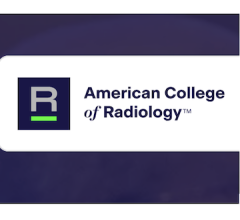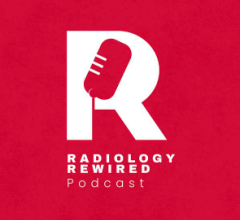
The American Cancer Society (ACS) has issued update lung cancer screening guidelines to help reduce the number of people dying from the disease due to smoking history. November is recognized as Lung Cancer Awareness Month, and Nov. 11 has been designated as National Lung Cancer Screening Day by ACS’ National Lung Cancer Roundtable. Image courtesy: Getty Images
November 10, 2023 — As the imaging community recognizes Lung Cancer Awareness Month in November, and Nov. 11 marks National Lung Cancer Screening Day by the American Cancer Society (ACS) National Lung Cancer Roundtable (NLCRT), Imaging Technology News is sharing newly-released guidelines issued by ACS which, on November 1, released an update of its lung cancer screening guideline to help reduce the number of people dying from the disease due to smoking history. The ACS statement is shared in its entirety here, along with a statement from the American College of Radiology (ACR).
The new guideline recommends yearly screening for lung cancer for people aged 50 to 80 years old who smoke or formerly smoked and have a 20-year or greater pack-year history. The recommended annual screening test for lung cancer is a low-dose computed tomography scan (also called a low-dose CT scan, or LDCT). The guideline, last updated in 2013, is published in the ACS flagship journal, CA: A Cancer Journal for Clinicians.
“This updated guideline continues a trend of expanding eligibility for lung cancer screening in a way that will result in many more deaths prevented by expanding the eligibility criteria for screening to detect lung cancer early,” said Dr. Robert Smith, senior vice president, early cancer detection science at the American Cancer Society and lead author of the lung cancer screening guideline report. “Recent studies have shown extending the screening age for persons who smoke and formerly smoked, eliminating the ‘years since quitting’ requirement and lowering the pack per year recommendation could make a real difference in saving lives.”
About Lung Cancer
Lung cancer is the overall leading cause of cancer death in the United States and is the second most frequently diagnosed malignancy in both men and women. In 2023, ACS researchers estimate 238,340 new cases of lung cancer (117,550 in men and 120,790 in women) will be diagnosed with about 127,070 deaths from the disease (67,160 in men and 59,910 in women). Anyone at any age can get lung cancer. However, lung cancer mainly occurs in older people, as most people diagnosed with the disease are aged 65 or older.
The updated guideline report is part of the ongoing guideline development process by ACS scientists. The ACS monitors medical and scientific literature for new evidence that may support a change in current guidelines or the development of a new guideline and information about screening that should be conveyed to clinicians and target populations.
How does the new guideline differ from the previously published guideline?
|
Item |
Previous Recommendations |
New Recommendations |
|
Age for eligibility |
55-74 years |
50-80 years |
|
Pack-year (PY) history |
30+ PY |
20+ PY |
|
Years since quitting (YSQ) |
≤ 15 YSQ |
No Longer Required |
In addition, report authors stress it’s important for people who are going to be screened to consult with their doctor about the potential benefits, limits, and harms of yearly screening with LDCT scans. People who still smoke should receive counseling to help them quit.
Who should NOT get screened for lung cancer?
Adults with health conditions that would greatly limit life expectancy or affect their ability or willingness to get lung cancer treatment if diagnosed should not be screened for the disease.
The American Cancer Society’s advocacy affiliate, the American Cancer Society Cancer Action Network (ACS CAN) works at all levels of government to advocate for policies to expand access to lung cancer screenings and tobacco control.
“This updated guideline is critical to identify all individuals who can benefit from the early detection of lung cancer,” said Lisa Lacasse, president of ACS CAN. “ACS CAN will continue to work to improve access to care and lung cancer screening at no cost for any person at risk of the disease to decrease lung cancer deaths and help end cancer as we know it, for everyone.”
“The good news is our research shows the number of new lung cancer cases diagnosed each year continues to decrease, partly because more people are quitting smoking (or not starting),” said ACS' Smith, continuing, “The number of deaths from lung cancer continues to drop as well, due to fewer people smoking and advances in early detection and treatment, but we still have to do better. This updated guideline is a step in the right direction.”
Today’s published guideline report also includes a patient page, an editorial from CA editors, and a systematic review of the evidence supporting dropping the years-since-quit criterion related to the new guideline. Modeling papers and epidemiologic research that support the new ACS guideline, as well as an updated analysis of the benefit-to-radiation-risk ratio from screening, were also published in the ACS journal Cancer. Other ACS authors include: Dr. Karli Kondo, Tyler Kratzer, Dr. Deana Baptiste, and Dr. William Dahut.
The complete ACS updated lung cancer screening guideline, and additional information about lung cancer prevention, diagnosis, and treatment is available on cancer.org, including the ACS Empowered to Quit program.
The following statement was issued by the American College of Radiology (ACR) in response to the new guidelines:
The American Cancer Society (ACS) released an update to its 2013 lung cancer screening guidelines Nov. 1, to guide screening to healthcare providers and their patients who are at high risk for lung cancer due to a history of smoking. The updated guideline recommends yearly screening for lung cancer for people aged 50 to 80 years old who smoke or formerly smoked and have a 20-year or greater pack-year history. It aligns with the 2021 U.S. Preventive Services Task Force (USPSTF) Lung Cancer Screening recommendation but goes further and eliminates the USPSTF ‘years since quitting’ requirement.
Lung cancer is the overall leading cause of cancer death in the United States and is the second most frequently diagnosed malignancy in both men and women, according to the ACS. This year, they estimate that 238,340 new cases of lung will be diagnosed, and about 127,070 people will die from the disease. Patients should continue to consult with their physicians to determine if lung cancer screening is appropriate for them.
American College of Radiology (ACR) members should continue to follow existing guidelines and consult with health plans directly for specific lung cancer screening coverage details. ACR has advocated for expanding existing overage criteria for lung cancer screening with USPSTF and the Centers for Medicare and Medicaid Services. These entities are not likely to update their existing recommendation to align with the updated ACS guideline, as they are on a specified timeline to update existing eligibility requirements and analyze new evidence.
More information: www.acs.org
Related content:
National Lung Cancer Screening Day Planned by American Cancer Society National Lung Cancer Rounddtable, Industry Partners
Cancer Screenings Have Saved the US at Least $6.5 Trillion, Study Estimates
VIDEO: Discussion on What's New and What's Next in Lung Screening with Kim Sandler, MD
One on One ... With Kim L. Sandler, MD
Special Report on Lung Cancer and Screening Initiatives
Special Report on Lung Cancer and Screening Initiatives, Part II
Special Report on Lung Cancer and Screening Initiatives, Part III


 February 04, 2026
February 04, 2026 









